118 have author last names that start with R have author last names that start with R
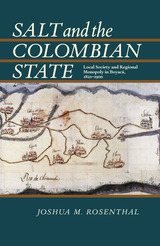
In republican Colombia, salt became an important source of revenue not just to individuals, but to the state, which levied taxes on it and in some cases controlled and profited from its production. The salt trade consistently accounted for roughly ten percent of government income.
In the town of la Salina de Chita, in Boyacá province, thermal springs offered vast amounts of salt, and its procurement and distribution was placed under the jurisdiction of the Ministry of Finance. Focusing his study on la Salina, Joshua M. Rosenthal presents a fascinating glimpse into the workings of the early Colombian state, its institutions, and their interactions with local citizens during this formative period. Although historians have cited the state’s weakness, and in many cases, its absence in local affairs, Rosenthal counters these assumptions by documenting the primary role the state held in administering contracts, inspections, land rights, labor, and trade in la Salina, and contends that this was not an isolated incident. He also uncovers the frequent interaction between the state and local residents, who used the state’s liberal rhetoric to gain personal economic advantage.
Seen through the lens of the administration of la Salina’s salt works, Rosenthal provides a firsthand account of the role of local institutions and fiscal management in the larger process of state building. His study offers new perspectives on the complex network of republican Colombia’s political culture, and its involvement in provincial life across the nation.

Finalist, 2022 INDIES Book of the Year Award, Poetry
Territorial explores the bargains that women make to stay safe from violence. Set in a landscape of looming ecological ruin, the poems bear witness to the effects of drought on the California chaparral region and delve into difficult personal terrain to reveal patterns of abuse we inflict on the earth and each other. How can we emerge from a devastated landscape into a sense of healing and repair? Using the characteristics of violence—repetition and escalation—the collection connects subjects that range from the dawn of recorded sound to the mapping of myths onto constellations, the ecosystem of a leach pond, and the photographs of Alfred Stieglitz. In tracing the ways narratives of predation imprint onto the body, memory, environment, and future generations, Territorial finds resilience in the powers of language to reshape experience.
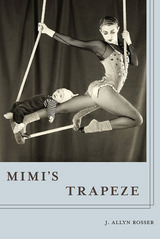
A driving force behind the poems in Mimi’s Trapeze is Rosser’s profound curiosity about all forms and conditions of life. Without distorting fact or motive, her speakers seek to navigate the mazes of our messy quotidian infelicities, ranging from imperfect love to squashing turtles on the road—from the history of artistic misrepresentations of women to global warming—attempting to calibrate the beautifully complex balance between desire and responsibility.
This collection dwells more on mortality and the lamentable state of the planet (and the spiritual unsoundness of its denizens) than her previous work. Another new vein can be traced in several poems that seek to distill a state like adolescence into a single word (“Dyahe”), reduce vast movements and disciplines into epigrammatic nutshells (Miniature Histories of the World”), or isolate a condition like grief in an element as simple as salt (“After the Service, the Widow Considers the Etymology of Salary”).
In Mimi’s Trapeze, her fourth book, Rosser takes a lighthearted view of dark subjects (see “Final Invitation”), and a dark view of light ones (“Intro to Happiness”). She has refined her vision, reaffirming her belief that poetry is the most direct and effective way for humans to alleviate their loneliness.
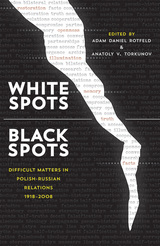
This pioneering study, prepared by the semi-official Polish-Russian Group on Difficult Matters, is a comprehensive effort to document and fully disclose the major conflicts and interrelations between the two nations from 1918 to 2008, events that have often been avoided or presented with a strong political bias. This is the English translation of this major study, which has received acclaim for its Polish and Russian editions.
The chapters offer parallel histories by prominent Polish and Russian scholars who recount each country’s version of the event in question. Among the topics discussed are the 1920 Polish-Russian war, the origins of World War II and the notorious Hitler-Stalin pact, the infamously shrouded Katyn massacre, the communization of Poland, Cold War relations, the Solidarity movement and martial law, and the renewed relations of contemporary Poland and Russia.
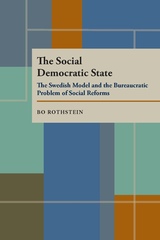
The Swedish Social Democratic Party, the SAP, is the most successful social democratic party in the world. It has led the government for most of the last six decades, participating either alone or as the dominant force in coalition government. The SAP has also worked closely with trade unions that have organized nearly 85 percent of the labor force, the highest rate among the advanced industrial democracies. Rarely has a political party been so dominant or so closely linked to labor movement. Yet Sweden remains very much a capitolist society with economic and social power firmly in the hands of big capitol.
If one wants to know if politics, and most especially if reformist politics, matters - if, that is, political mobilization can change democratic capitolists societies - then Sweden under the Social Democrats is clearly one of the best empirical cases to study.
Bo Rothstein uses the Swedish experience to analyze the limits a social democratic government labors under and the possibilities it enjoys in using the state to implement large-scale social change. He examines closely two SAP programs, one a success and the other a failure, that attempted to change social processes deeply embedded in capitolist society. He ties the outcomes of these programs to the structure of the state and hypothesizes that the outcome depends, to a considerable extent, on how administrative apparatuses responsible for implementing each policy are organized. Rothstein concludes that no matter how wisely a reformist policy is designed nor how strong the political party behind it, if the administrative arrangements are faulty, it will fail at the stage of implementation.
Rothstein convincingly demonstrates that the democratic capitolist countries of the world have important lessons to learn from the Swedish experience regarding the possibilities for political reform. Political scientists and political reformers alike can learn much from Rothstein’s deep knowledge of Swedish government and his innovative model for analyzing political reform in social democratic societies.
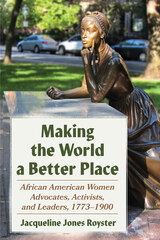
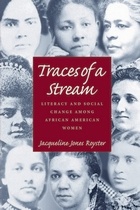
Traces of a Stream offers a unique scholarly perspective that merges interests in rhetorical and literacy studies, United States social and political theory, and African American women writers. Focusing on elite nineteenth-century African American women who formed a new class of women well positioned to use language with consequence, Royster uses interdisciplinary perspectives (literature, history, feminist studies, African American studies, psychology, art, sociology, economics) to present a well-textured rhetorical analysis of the literate practices of these women. With a shift in educational opportunity after the Civil War, African American women gained access to higher education and received formal training in rhetoric and writing. By the end of the nineteenth-century, significant numbers of African American women operated actively in many public arenas.
In her study, Royster acknowledges the persistence of disempowering forces in the lives of African American women and their equal perseverance against these forces. Amid these conditions, Royster views the acquisition of literacy as a dynamic moment for African American women, not only in terms of their use of written language to satisfy their general needs for agency and authority, but also to fulfill socio-political purposes as well.
Traces of a Stream is a showcase for nineteenth-century African American women, and particularly elite women, as a group of writers who are currently underrepresented in rhetorical scholarship. Royster has formulated both an analytical theory and an ideological perspective that are useful in gaining a more generative understanding of literate practices as a whole and the practices of African American women in particular. Royster tells a tale of rhetorical prowess, calling for alternative ways of seeing, reading, and rendering scholarship as she seeks to establish a more suitable place for the contributions and achievements of African American women writers.
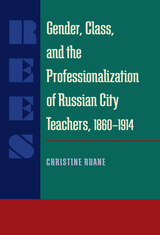
Ruane's research and insightful analysis broadens our knowledge of an emerging professional class, especially newly educated and emancipated women, during Russia's transition to a more modern society.

To understand this landscape Jasper Rubin not only explores the built environment but also the major forces that have been at work in its redevelopment. While factors such as new transportation technology and economic restructuring have been essential to the process and character of the waterfront’s transformation, the impact of local, grassroots efforts by planners, activists, and boosters have been equally critical.
The first edition of A Negotiated Landscape won the 2012 prize for best book in planning history from the International Planning History Society. Much has changed in the five years since that edition was published. For this second edition, Rubin provides a new concluding chapter that updates the progress of planning on San Francisco’s waterfront and examines debates over the newest visions for its development.
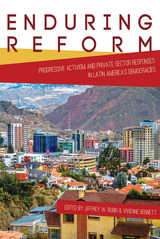
Enduring Reform presents five case studies from Mexico, Brazil, and Argentina in which marginalized groups have successfully forged new cultural and economic spaces and won greater autonomy and political voice. Bringing together NGO’s, local institutions, social movements, and governments, these initiatives have developed new mechanisms to work ‘within the system,’ while also challenging the system’s logic and constraints.
Through firsthand interviews, the contributors capture local businesspeople’s understandings of these progressive initiatives and record how they grapple with changes they may not always welcome, but must endure. Among their criteria, the contributors evaluate the degree to which businesspeople recognize and engage with reform movements and how they frame electoral counterproposals to reformist demands. The results show an uneven response to reform, dependent on cultural as much or more than economic factors, as businesses move to decipher, modify, collaborate with, outmaneuver, or limit progressive innovations.
From the rise of worker-owned factories in Buenos Aires, to the collective marketing initiatives of impoverished Mayans in San Cristóbal de las Casas, the success of democracy in Latin America depends on powerful and cooperative social actions and actors, including the private sector. As the cases in Enduring Reform show, the democratic context of Latin America today presses businesspeople to endure, accept, and at times promote progressive change in unprecedented ways, even as they act to limit and constrain it.
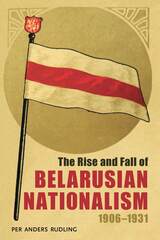
The revolution of 1905 opened a window of opportunity, and debates swirled around definitions of ethnic, racial, or cultural belonging. By March of 1918, a small group of nationalists had declared the formation of a Belarusian People’s Republic (BNR), with territories based on ethnographic claims. Less than a year later, the Soviets claimed roughly the same area for a Belarusian Soviet Socialist Republic (BSSR). Belarusian statehood was declared no less than six times between 1918 and 1920. In 1921, the treaty of Riga officially divided the Belarusian lands between Poland and the Soviet Union. Polish authorities subjected Western Belarus to policies of assimilation, alienating much of the population. At the same time, the Soviet establishment of Belarusian-language cultural and educational institutions in Eastern Belarus stimulated national activism in Western Belarus. Sporadic partisan warfare against Polish authorities occurred until the mid-1920s, with Lithuanian and Soviet support. On both sides of the border, Belarusian activists engaged in a process of mythmaking and national mobilization. By 1926, Belarusian political activism had peaked, but then waned when coups d’états brought authoritarian rule to Poland and Lithuania. The year 1927 saw a crackdown on the Western Belarusian national movement, and in Eastern Belarus, Stalin’s consolidation of power led to a brutal transformation of society and the uprooting of Belarusian national communists.
As a small group of elites, Belarusian nationalists had been dependent on German, Lithuanian, Polish, and Soviet sponsors since 1915. The geopolitical rivalry provided opportunities, but also liabilities. After 1926, maneuvering this complex and progressively hostile landscape became difficult. Support from Kaunas and Moscow for the Western Belarusian nationalists attracted the interest of the Polish authorities, and the increasingly autonomous republican institutions in Minsk became a concern for the central government in the Kremlin.
As Rudling shows, Belarus was a historic battleground that served as a political tool, borderland, and buffer zone between greater powers. Nationalism arrived late, was limited to a relatively small elite, and was suppressed in its early stages. The tumultuous process, however, established the idea of Belarusian statehood, left behind a modern foundation myth, and bequeathed the institutional framework of a proto-state, all of which resurfaced as building blocks for national consolidation when Belarus gained independence in 1991.

Prime minister of Sweden and leader of the Social Democratic party from 1946-1969, Tage Erlander enjoyed a career that was remarkable both for its major accomplishments and longevity. Under his leadership, Sweden became an exemplary welfare state following World War II. Universal pensions, child support, health insurance, extended paid vacations, subsidized housing, and many other benefits made Sweden's standard of living the envy of the world.
This definitive political biography is both the study of an individual style of leadership and the role of the prime minister in a parliamentary state. It shows Erlander as a complex and engaging intellectual fiercely loyal to his party, agitative yet dedicated to cooperation between parties.
Olof Ruin analyzes Erlander's various roles as Riksdag caucus leader, cabinet organizer, party leader, promoter of domestic consensus, and foreign policy maker. Ruin is the first scholar to be given unrestricted access to Erlander's diaries.
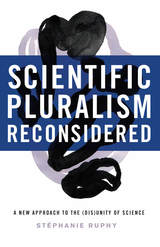
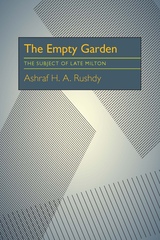
The Empty Garden draws a portrait of Milton as a cultural and religious critic who, in his latest and greatest poems, wrote narratives that illustrate the proper relationships among the individual, the community, and God. Rushdy argues that the political theory implicit in these relationships arises from Milton’s own drive for self-knowledge, a kind of knowledge that gives the individual freedom to act in accordance with his or her own understanding of God’s will rather than the state’s. Rushdy redefines Milton’s creative spirit in a way that encompasses his poetic, political, and religious careers.

While biographers of Andy Warhol have long recognized his mother as a significant influence on his life and art, Julia Warhola’s story has not yet been told. As an American immigrant who was born in a small Carpatho-Rusyn village in Austria-Hungary in 1891, Julia never had the opportunity to develop her own considerable artistic talents. Instead, she worked and sacrificed so her son could follow his dreams, helping to shape Andy’s art and persona. Julia famously followed him to New York City and lived with him there for almost twenty years, where she remained engaged in his personal and artistic life. She was well known as “Andy Warhol’s mother,” even developing a distinctive signature with the title that she used on her own drawings.
Exploring previously unpublished material, including Rusyn-language correspondence and videos, Andy Warhol’s Mother provides the first in-depth look at Julia’s hardscrabble life, her creative imagination, and her spirited personality. Elaine Rusinko follows Julia’s life from the folkways of the Old Country to the smog of industrial Pittsburgh and the tumult of avant-garde New York. Rusinko explores the impact of Julia’s Carpatho-Rusyn culture, Byzantine Catholic faith, and traditional worldview on her ultra-modern son, the quintessential American artist. This close examination of the Warhola family’s lifeworld allows a more acute perception of both Andy and Julia while also illuminating the broader social and cultural issues that confronted and conditioned them.
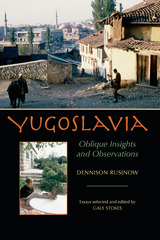
Rusinow's essays explore such diverse topics as the first American-style supermarket and its challenge to traditional outdoor markets; the lessons of a Serbian holiday feast (Slava); the resignation of vice president Rankovic; the Croatian Spring of 1971; ethnic divides and the rise of nationalism throughout the country; the tension between conservative and liberal forces in Yugoslav politics; and the student revolt at Belgrade University in 1968. Rusinow's final report in 1991 examines the serious challenges to the nation's future even as it collapsed.
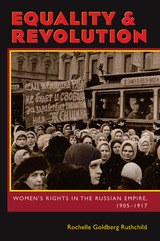
Ruthchild offers a telling examination of the dynamics present in imperialist Russia that fostered a growing feminist movement. Based upon extensive archival research in six countries, she analyzes the backgrounds, motivations, methods, activism, and organizational networks of early Russian feminists, revealing the foundations of a powerful feminist intelligentsia that came to challenge, and eventually bring down, the patriarchal tsarist regime.
Ruthchild profiles the individual women (and a few men) who were vital to the feminist struggle, as well as the major conferences, publications, and organizations that promoted the cause. She documents political party debates on the acceptance of women’s suffrage and rights, and follows each party’s attempt to woo feminist constituencies despite their fear of women gaining too much political power. Ruthchild also compares and contrasts the Russian movement to those in Britain, China, Germany, France, and the United States. Equality and Revolution offers an original and revisionist study of the struggle for women’s political rights in late imperial Russia, and presents a significant reinterpretation of a decisive period of Russian—and world—history.
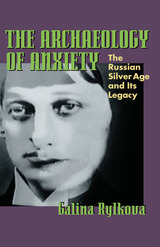
The “Silver Age” (c. 1890-1917) has been one of the most intensely studied topics in Russian literary studies, and for years scholars have been struggling with its precise definition. Firmly established in the Russian cultural psyche, it continues to influence both literature and mass media. The Archaeology of Anxiety is the first extended analysis of why the Silver Age occupies such prominence in Russian collective consciousness.
Galina Rylkova examines the Silver Age as a cultural construct-the byproduct of an anxiety that permeated society in reaction to the social, political, and cultural upheavals brought on by the Bolshevik Revolution, the fall of the Romanovs, the Civil War, and Stalin's Great Terror. Rylkova's astute analysis of writings by Anna Akhmatova, Vladimir Nabokov, Boris Pasternak and Victor Erofeev reveals how the construct of the Silver Age was perpetuated and ingrained.
Rylkova explores not only the Silver Age's importance to Russia's cultural identity but also the sustainability of this phenomenon. In so doing, she positions the Silver Age as an essential element to Russian cultural survival.
READERS
Browse our collection.
PUBLISHERS
See BiblioVault's publisher services.
STUDENT SERVICES
Files for college accessibility offices.
UChicago Accessibility Resources
home | accessibility | search | about | contact us
BiblioVault ® 2001 - 2024
The University of Chicago Press









